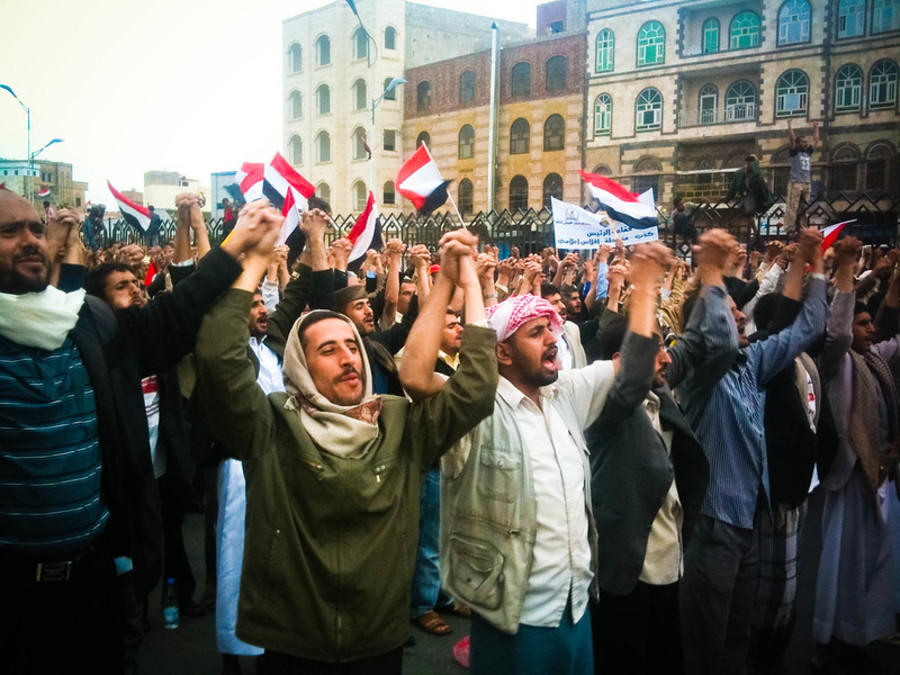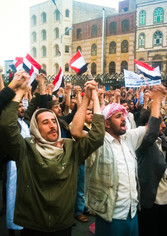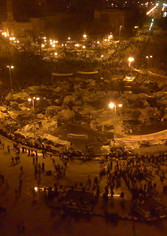Conferences and debates
Index / Activities / Conferences and debates / Conference series: “The People Want...”
Conference series: “The People Want...”
From January 11, 2021 until July 31, 2021
ONLINE
Check dates and times for each activity.
During the first semester of 2021, Casa Árabe will be holding a series
of conferences on the social movements known as the “Arab springs,” now
one decade in the past.
“The people want to overthrow the regime” (Ash-Shab yurīd isqāṭ an-Nizam) is undoubtedly the political slogan most closely associated with the bustling activity in the streets of Cairo, Manama, Deraa, Sanaa, Khartoum and Beirut ten years ago. In the manner of “They shall not pass” or “The people united shall never be divided,” the slogan marked a moment that has left a mark on the collective Arab imaginary which we must reflect upon a decade later.
During the first half of the year, we will be devoting special sessions to Yemen (Tuesday, January 12), Egypt, Tunisia, Libya, Syria and Bahrain.
During the first half of the year, we will be devoting special sessions to Yemen (Tuesday, January 12), Egypt, Tunisia, Libya, Syria and Bahrain.
-
Yemen under the magnifying glass
January 12, 20216:00 p.m.ONLINECasa Árabe’s YouTube channel. 6:00 p.m.In English with simultaneous translation into Spanish.On Tuesday, January 12, we will be giving this conference in collaboration with the Center for Strategic Studies of Sanaa. You can watch it live on our Youtube channel.Yemenis are already facing what the UN has classified as the world’s worst humanitarian crisis, and everything indicates that their suffering will only increase as more local communities are forced to take sides. Given the ongoing lack of an agreement, and with the forces of the so-called Arab Coalition (Saudi Arabia and the United Arab Emirates) greatly reduced, local role-players are now positioning themselves for war on behalf of their external sponsors. After six years of armed conflict, the country has split at least three ways: the Houthis in the north fighting the Abu Dhabi-backed secessionists, and the weak government of Abdrabbo Mansur Hadi in the east with support from Riyadh. The influx of money and weapons from regional actors will lead to further polarization. And, by turning the conflict into a full-fledged proxy war, the states that once formed the Arab Coalition will be able to shirk their responsibility in providing reparations and assistance to rebuild the country.
Sidestepped in international headlines, the country deserves an in-depth analysis of the past and the interference that has led it to this alarming situation, and of the uncertain future of its people. Casa Árabe and the Center for Strategic Studies of Sanaa are organizing this round table with Farea Al-Muslimi, director and co-founder of the center, Ghaithaa Alrashidy, a researcher and visual data specialist at the same think-tank, and journalist Natalia Sancha, a contributor to El País, who provided special coverage of Yemen in late 2020. Presented by Karim Hauser, Casa Árabe’s Coordinator of International Relations.
Farea Al-Muslimi is the director and co-founder of the Center for Strategic Studies in Sanaa. He is also an associate member of Chatham House. Prior to that, he worked for the Carnegie Middle East Center in Beirut and the Middle East Institute in Washington, D.C. as a visiting scholar, where he covered Yemen and the Gulf. In August 2016, UN Secretary-General Ban-Ki Moon appointed Al-Muslimi to become a member of the Advisory Panel of Experts for the Study of Progress on Youth, Peace and Security, a study mandated by Security Council Resolution 2250 to examine the positive contribution of youths to peace processes, conflict resolution and effective responses at the local, national, regional and international levels. Al-Muslimi’s publications on Yemen and the region have appeared in Foreign Affairs, Foreign Policy, New York Times, The National, The Independent, The Guardian, Al-Hayyat, Assafir Arabi, Al-Monitor and other publications.Natalia Sancha is an independent journalist and photographer who specializes in the Arab world. She has been living in Lebanon since 2008. Since 2011, she has covered the wave of popular protests in the Middle East and the later conflicts in countries such as Egypt, Yemen, Lebanon and Syria, as well as the resulting flow of refugees and their impact on the region. She also contributes to the Spanish daily newspaper El País, for Lebanon and Syria, and publishes analyses on regional politics in Esglobal and Política Exterior. She co-authored the book Siria. La primavera marchita (Syria: The wilted spring). She earned her Master’s degree in Contemporary Arab Studies at Georgetown University as a Fulbright scholar, and was a finalist for the Cirilo Rodríguez Award in both 2018 and 2019.Ghaidaa Alrashidy is a researcher and a visual data specialist with the Sana’a Center for Strategic Studies. Her research focuses on southern Yemen, and security and social issues in southern governorates. She is also a co-presenter on Dunyana, a weekly TV show on BBC Arabic that deals with issues pertinent to women in the Arab world.Alrashidy has worked for almost a decade in development programs with various international organizations, including the International Organization for Migration, Mercy Corps and Responsive Governance Project (USAID). Alrashidy holds a BS in architecture and a diploma in gender studies from the University of Aden. She is currently a master’s candidate in Urbanism at the Lebanese University in Beirut. -
Tahrir: Ten years later
January 25, 20216:00 p.m.ONLINECasa Árabe’s YouTube channel. 6:00 p.m.In Spanish.On January 25, Casa Árabe has invited Professor Ibrahim Awad and journalist Francesca Cicardi to analyze the legacy of Tahrir Square one decade later. You can watch it live on our YouTube channel.Ten years ago a series of popular uprisings in the Arab world broke with decades of lethargy and burst onto the world scene, unleashing major transformations in the region. This mobilization in the streets led to intense social pressure which caused the downfall of more than one leader in the region. Among the most symbolic settings in this so-called Arab Spring was Tahrir Square in Egypt, where demonstrations resulted in the subsequent resignation of President Hosni Mubarak. But the transition in the region’s most populous country has not been easy for the enthusiastic youths of 2011, or for those who hoped to see a civil and democratic state grow stronger.In order to analyze Tahrir’s legacy and the effects of Egypt’s political upswings and downswings, and as part of the series of talks titled “The People Want…,” Casa Árabe has invited Ibrahim Awad, a professor at the Global Affairs and Public Policy (GAPP) School at the American University of Cairo and Francesca Cicardi, a correspondent for the Efe News Agency in Cairo, to speak at our institution. The event will be moderated by Karim Hauser, Casa Árabe’s International Relations Coordinator.Ibrahim Awad is a professor of Global Affairs at the American University of Cairo’s School of Global Affairs and Public Policy (GAPP). He specializes in political economics, international labor-related migration and regional integration. He has worked at several international organizations, including the United Nations Economic and Social Commission for Western Asia (ESCWA) and the International Labor Organization (ILO), where he was director of the Subregional Office for North Africa (2001-2005) and the International Migration Program (2005-2010). He directs the Center for Migration and Refugee Studies (CMRS-AUC).
Francesca Cicardi is a journalist who has been based in Cairo since the year of 2008. She reported on the Egyptian revolution, which she lived from the inside, even before it began on January 25, 2011. She has also followed the conflict in Libya and has provided special coverage in the Middle East, from Syria and Iraq to Tunisia. She has been a correspondent in the Middle East for the newspaper La Razón and other Spanish, Latin American and Italian media. With a bachelor’s degree from the Universidad Complutense de Madrid, in June 2007, she was awarded the “EFE News Agency - La Caixa” international fellowship, through which she received training at the main headquarters of the EFE News Agency in Madrid throughout 2007. She is now working as the editorial coordinator at the Middle East Office of that same news agency in Cairo.
-
Tunisia: The road towards transition
February 22, 20216:00 p.m.ONLINECasa Árabe’s YouTube channel. 6:00 p.m.In French, with simultaneous translation into Spanish.On Monday, February 22, on our YouTube channel (in Spanish and French) we will be giving a new session in our conference series “The People Want...” about Tunisia.Tunisia provides a clear example of successful democratic transition in the Arab world. Although it faces a number of political and socio-economic challenges, the truth is that this North African country has managed to leave authoritarianism behind. Proof of this is that elections are held regularly, the parliament is active and made up of ideologically different political parties, while the population enjoys the basic freedoms of any democracy.
The flip side of the coin is a situation of profound governmental instability: disagreements between the president and the prime minister, as well as between the executive branch and the head of the legislature. In the meantime, popular protests against the political class and the adverse socio-economic situation continue to take place in streets across the nation.
As a part of the series of talks titled “The People Want..” about the tenth anniversary of the so-called “Arab Springs,” Casa Árabe, with the cooperation of Stractegia, will be discussing the case of Tunisia with three specialists from that country: Farah Hached, a legal expert and founder of the “Democratic Laboratory,” Huda Mzioudet, a freelance journalist and researcher, and Tarek Kahlaoui, a political scientist, a professor at the Mediterranean School of Business and a researcher at Stractegia. Presented by Karim Hauser, Casa Árabe’s Coordinator of International Relations. Moderated by: Barah Mikaïl, director of Stractegia.
Farah Hamed is a lawyer, the vice-president of Mahmoud el-Materi University, president of the Tunisian think-tank ”Labo’ Démocratique” and author of the book “Révolution tunisienne et défis sécuritaires” (“Tunisian Revolution and Security Challenges”).
Tarek Kahlaoui completed his PhD at the University of Pennsylvania, and is a political activist and analyst. From 2012 through 2014, he ran the think-tank ”Strategic Studies Institute of Tunisia,” which was linked to the country’s Presidency, and he frequently writes about politics and security-related affairs in Tunisia.
Huda Mzioudet is an academic researcher and student of Political Science and International Relations at the University of Toronto, in Canada.




